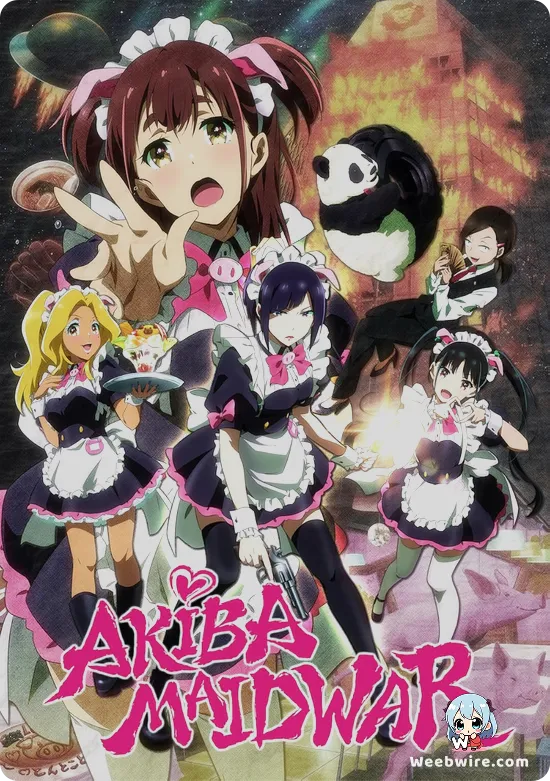
Back to Anime List

© P.A.WORKSwww.primevideo.com
Overview
Set in an alternate, highly stylized version of Akihabara in 1999, Akiba Maid War presents a darkly comedic and action-packed narrative that aggressively deconstructs the conventional moe maid café trope. The story follows Nagomi Wahira, a relentlessly optimistic 17-year-old who travels to Tokyo with aspirations of becoming a cheerful, exemplary maid. Her dreams quickly collide with the harsh reality of the Oinky Doink Café, a struggling establishment managed by the ruthless Creature Group syndicate. Nagomi is swiftly inducted into a violent underground world where rival maid cafés function as yakuza-style gangs, ruthlessly competing for territory, power, and respect through bloody turf wars and organized crime. Nagomi’s forced mentor is Ranko Mannen, a mysterious 35-year-old veteran maid whose stoic demeanor and deadly combat skills hint at a traumatic past within this violent industry. The anime masterfully utilizes tonal juxtaposition, blending the saccharine sweetness of typical maid service—complete with adorable costumes and charming dialogue—with sudden, shocking outbreaks of extreme, cinematic violence. This unique blend transforms the neon-lit streets of 1999 Akiba into a brutal battleground where themes of innocence corrupted, the fight for survival, the nature of loyalty, and the cyclical destruction inherent in gang life are explored. The series is a profound and often hilarious examination of how far people will go to maintain a façade of cuteness while navigating a truly savage commercial environment.
Opinion
Akiba Maid War stands out as a high-concept, highly successful genre parody, executed with remarkable precision and commitment by P.A.WORKS. The technical execution is consistently strong, particularly the animation. Action sequences are fluidly choreographed and impactful, featuring dramatic camera work and satisfyingly stylized violence that contrasts sharply with the adorable character designs and vibrant, nostalgic 1999 Akihabara setting. The voice acting is crucial to the show’s success; the performances perfectly capture the dual nature of the characters, from Nagomi’s high-pitched naiveté to Ranko’s chillingly deadpan delivery, effectively selling both the comedy and the drama. Story pacing is aggressive and efficient, moving quickly through various gang conflicts while dedicating necessary time to developing the central relationship between Nagomi and Ranko. The thematic depth is surprisingly rich, using the absurdity of maid warfare to comment on labor exploitation, the demands of performance, and the crushing weight of institutionalized violence. While the constant tonal shifts could be jarring in lesser hands, the series maintains a cohesive, albeit chaotic, identity. The narrative structure, featuring distinct arcs culminating in a powerful finale, ensures that the series is not just a gimmick but a genuinely compelling narrative study.
Characters
Shiipon
Voice: N/A
Ranko Mannen
Voice: N/A
Yumechi
Voice: N/A
Nagomi Wahira
Voice: N/A
Credits
Studio
P.A.WORKS
Cover Art
N/A
Publisher
N/A
Producers
P.A.WORKS
Episodes
Season 1
12 episodesInformation
StatusCompleted
Total Episodes12
Duration24 min
Rating7.8
ReleasedFall 2022
Seasons1
Genres
ActionComedyDrama
Related Anime

Fullmetal Alchemist: Brotherhood
Spring 2009★ 9.2
ActionAdventure+2

Haikyu!!
Spring 2014★ 9.1
ComedyDrama+3

Attack on Titan
Spring 2013★ 9
ActionAdventure+2

Hunter x Hunter Story, Characters, Revival News, & Similar Anime
Fall 2011★ 9
ActionAdventure+3

Gintama.: Slip Arc
Fall 2017★ 8.9
ActionComedy+2

Hajime no Ippo: The Fighting!
Fall 2000★ 8.9
ComedyDrama+1